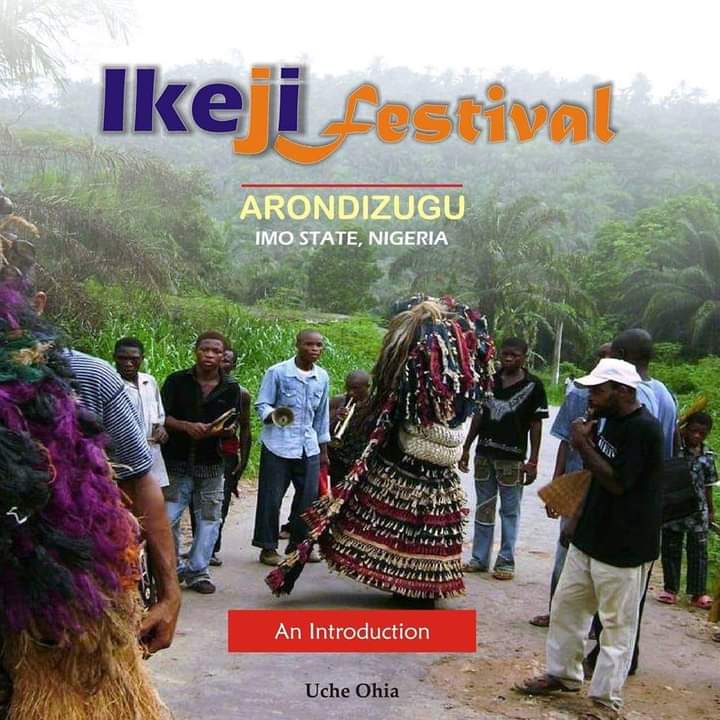Exposing Nigeria
An Introduction To Ikeji Arondizuogu Festival -By Mazi Uche Ohia
Every tourist, visitor, student, enthusiast and just about anyone who has heard, witnessed or is curious about Ikeji or who seeks to understand what the festival is all about will find this book profoundly gratifying.

INTRODUCTION
Ikeji (pronounced ikeeji) is a festival which holds annually in Arondizuogu, a sprawling group of communities covering a vast area and spread across the three local government areas of Ideato North, Okigwe and Onuimo in Imo State of Nigeria. Usually held between March and April every year, Ikeji is a fascinating and irresistible festival filled with pulsating rhythms and colourful performances. Ikeji Festival brings all Arondizuogu people and, in deed, many Igbo speaking people all over the world together. It is probably the most captivating carnival of masquerade displays on the African continent. This cultural fiesta, listed in the National Tourism Calendar by the Federal Ministry of Culture and Tourism in Nigeria as well as the Imo State Government official website has transformed Arondizuogu into a popular tourism destination for hundreds of thousands of domestic and international visitors enchanted by the frills and thrills of Ikeji.
Although more and more people are drawn to Arondizuogu each year to witness the exquisite performances that characterise Ikeji, it is obvious that few people really understand the significance of the festival. The Frequently Asked Questions (FAQs) about Ikeji Festival even by younger members of Arondizuogu community attests to this fact. To fill this obvious lacuna and to ensure that Ikeji enthusiasts enjoy the fiesta to the fullest, it is necessary that they are provided with ample information and enlightenment about Ikeji in it’s multidimensional magnificence.
As a source of illumination of the miasma and ambivalence that surrounds Ikeji, IKEJI FESTIVAL – An Introduction is the ultimate Tourists’ Guide.
Every tourist, visitor, student, enthusiast and just about anyone who has heard, witnessed or is curious about Ikeji or who seeks to understand what the festival is all about will find this book profoundly gratifying.
A. ORIGIN OF IKEJI FESTIVAL
The origin of Ikeji Festival is shrouded in mythology. Many versions exist. Historical evidence, however, suggests that Ikeji began as a ceremony to mark the end of one planting season and the beginning of another. ‘Ikeji’ is said to be a shortened form of ‘ike ji isi’ (to detach the tendril of the yam) which is usually done in preparation for the farming season or for preservation of seed yams in the yam barn. Ikeji, therefore, serves to usher in the new farming season. In it’s pristine form, Ikeji had two dimensions – ritual and entertainment – involving sets of obligations to God, ancestors, superiors, elders and grand-children. In it’s modern form, Ikeji festival is, essentially, a festival of propitiation and thanksgiving which dovetails into a carnival of immense proportions involving exhibitions of exuberant displays and passionate demonstrations. In Arochukwu, the ancestral home of Arondizuogu people, Ikeji is held in the month of September. It serves as a forum to bring back Aros in diaspora (Aro uzo) in a massive annual homecoming to the ancestral homeland. Over the last century, however, ancient ties of Aro uzo to Arochukwu have grown thinner and thinner and local conditions more or less determine the Ikeji schedule. In Arondizuogu, Ikeji is held in March or April. It is not clear how this came about but historians believe that the time may have been chosen to suit local conditions.
Historical Development
Until the mid 20th century, Ikeji Festival was held separately by the component towns and villages of Arondizuogu. From localized festivals held at varying times by various towns and villages of Arondizuogu, Ikeji grew to become a unified festival celebrated universally throughout the length and breadth of Arondizuogu. Presently, Ikeji is transforming into a major pan-Igbo carnival attended by hundreds of thousands of local and foreign participants and spectators.
Scheduling
The determination of each year’s Ikeji Festival schedule is an important element of Ikeji Festival which is guided by Arondizuogu tradition.
The duty of fixing and announcing the schedule of each year’s Ikeji Festival, is vested in Akajiofor Ndiheme, (that is, Ndiheme Eze-in-Council) in consultation with Akajiofor Ndizuogu (that is, Ndizuogu Eze-in-Council). Historical studies show that this has been the practice from antiquity and every generation has maintained this tradition much the same way that Ogidi Akeme is taken to mark the annual ending of indentured labour in Arondizuogu.
In practice, the function of Akajiofor Ndiheme consists simply of fixing the date of the ritual now commonly known as “Ikeji Iheme”. The date of Ikeji Festival is determined mutatis mutandis from the date of Ikeji Iheme by extrapolation. By Arondizuogu custom, Ikeji Festival takes place izu-na-asaa (that is, seven weeks of the Igbo calendar which is equal to 28 days) from the date of Ikeji Iheme. To a large extent, the role of Akajiofor Ndiheme in the scheduling of Ikeji Festival underscores the traditional obligations for which Ikeji was known. These obligations radiated from the younger to the older, from the junior to the senior, and from the subordinate to the superior. Central to these obligations is the customary paying of homages known in Arondizuogu as “ibu ihu”, a tradition that goes back to ancient times but which is gradually becoming moribund.
Publicity and Promotion
The duty of formally publicizing and promoting Ikeji Festival is vested in Arondizuogu Patriotic Union (APU), the umbrella organisation of Arondizuogu communities at home and in Diaspora in collaboration with Arondizuogu Council of Traditional Rulers. Usually, APU carries out this function by setting up a Local Organising Committee (LOC) for each year’s festival comprising of nominees of the traditional rulers, the union and statutory authorities. The LOC, usually, engages consultants and involves corporate sponsors with the consent and approval of the union to ensure the success of the festival.
Preparation
By Arondizuogu custom and tradition, once the date of ikeji is pronounced, certain activities become forbidden. For instance, no other event may be scheduled after the announcement of Ikeji date. In particular, no burial may be held in Arondizuogu until after the Ikeji festivities. Other taboos exist with lesser severity.
The Build Up
Days to the festival, the sound of slit drums can be heard around the vast community floating in the windless nights and increasing in tempo as the D’ Day draws closer. As the sound whirls, it stirs innate memories of a heroic past accentuated by the soulful ballads known as mbem which comes naturally to most male members of the community. From various directions, piercing sounds of flutes raise the momentum higher with their exhilarating resonance. In surrounding bushes, young men joyfully invade palms trees, eulogizing favourite masquerades as they cut palm fronds that would be twirled to make whips.
Duration
Ikeji is a four-day festival held annually in March or April. Reckoned by the Igbo calendar, this is equal to one week which corresponds to the four Igbo market days of Orie (Oye), Afor (Awhor), Nkwo and Eke. Each of these days has a special significance and represents one of the several dimensions of ikeji. The next four days are also considered as part of the festival being the period when masquerades commence the valedictory displays in local market places known as izu ahia nmonwu. The preceding Afor and Eke market days being the preliminary days before the Ikeji Festival day proper also have cultural connotations.
Up Next –
IKEJI FESTIVAL DAYS AND THEIR SIGNIFICANCE
(TO BE CONTINUED)


















